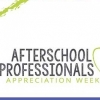| << Previous 1 - 2 Next >> |
Students of Color and from Low-Income Families Most Likely to Miss Out
Afterschool and summer programs are invaluable to rural communities across Arkansas and the entire country. “Spiking Demand, Growing Barriers: The Trends Shaping Afterschool and Summer Learning in Rural Communities” investigates whether afterschool and summer in rural communities has changed over time, compares parents’ perceptions of afterschool programs now and then, and discusses what lessons can be drawn to help increase access to afterschool and summer programs in rural communities.
Top Takeaways Include:
1. Rural communities see a sharp rise in unmet demand for afterschool and summer programs
Unmet demand in rural communities is high: For every rural child in a summer learning program, two more would be enrolled if a program were available. In Arkansas, that number increases to three.
2. Roadblocks to access prevent rural kids from attending afterschool and summer programs
Barriers to afterschool and summer program participation have increased, including the cost of programs, children not having access to safe transportation, inconvenient locations, and the lack of availability.
3. Inequities exist
In rural communities, unmet demand and barriers to participation are greater among communities of
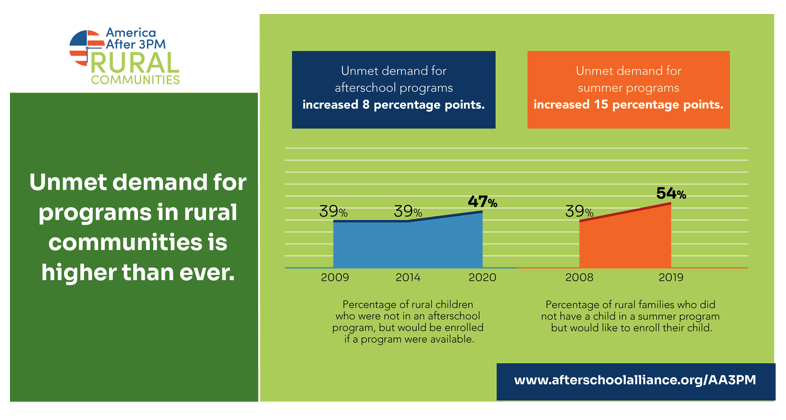 color and families with low incomes.
color and families with low incomes. 4. Rural parents see the benefits and support afterschool and summer learning
More than 9 in 10 rural parents with children in afterschool and summer programs report satisfaction. Eighty-three percent of parents agree that all young people deserve access to quality afterschool and summer learning programs. Additionally, 86 percent of rural parents support public funding for afterschool and summer learning.
Afterschool and summer learning programs offer unique benefits to kids across the country, but millions are missing out. Check out the data dashboard to learn more.
Arkansas Shines a Light on Afterschool
Hundreds of children, parents, afterschool professionals, policy makers and community leaders celebrated the importance of afterschool and summer learning programs Thursday at more than 15 events across the state. Lights on Afterschool, an annual advocacy celebration, focused on the need for afterschool now more than ever as an estimated 65,000 Arkansas children are left unsupervised and at risk throughout the week.
Across Arkansas, programs gathered in-person and virtually for activities lifting up youth voice, service and community activism. This year's events also focused on the extraordinary support programs have provided to children and families during the 2020 pandemic. From virtual tutoring and online afterschool to meal delivery and Broadband hotspots, afterschool programs proved they are a vital resource now more than ever. Check out our blog post recap to learn more about how Arkansas programs stepped up to shine a light on afterschool this year.
Video Contest Winners
We asked and you rose to the challenge! The following programs went above and beyond with video submissions for Lights on Afterschool and earned $100 donation for program supplies! Congratulations!
- SOAR Afterschool
- Girl Scouts of Arkansas
- Tendaji CDC
- Boys and Girls Club of Van Buren – Cedarville
Lights on Afterschool
November 25, 2019
Lights on Afterschool, a national advocacy day shining a light on the importance of afterschool learning may have past on October 24, but we’re still celebrating!
Governor Asa Hutchinson proclaimed October 24 Lights on Afterschool in Arkansas and over 40 programs hosted events. Our partner Arkansas State University even lit up the Dean B. Ellis Library in honor of afterschool!

Afterschool For All Challenge 2019
by Graycen Bigger | June 24, 2019
If Congress were to go along with that proposal, students and families across our state would be adversely affected in very significant ways. That’s why the AOSN team joined hundreds of afterschool advocates on June 12 at the annual Afterschool for All Challenge in Washington D.C.

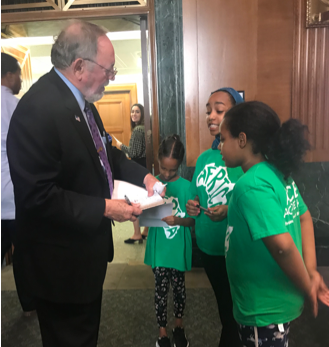
Young people from around the country had the opportunity to present afterschool learning projects and meet with members of Congress at the Afterschool Showcase.
The Afterschool for All Challenge featured a visit to Capitol Hill to meet with each of our Representatives and Senators along with an afterschool showcase. Our team, which included AOSN Network Director Laveta Wills-Hale, AOSN Communications Coordinator Graycen Colbert Bigger and Camp War Eagle SOAR Site Director Abigail Smith, had the opportunity to meet with Senator John Boozman, Senator Tom Cotton, Representative Bruce Westerman, Representative Rick Crawford and aides to Representative French Hill and Representative Steve Womack about how important afterschool programs are to Arkansas communities and all they do for children and working families.
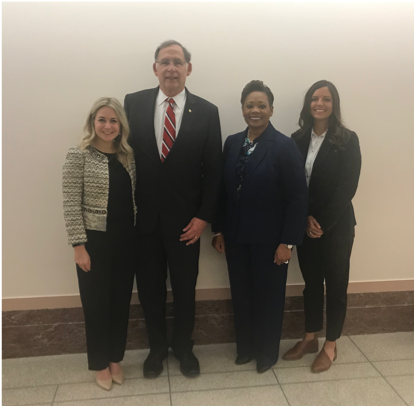
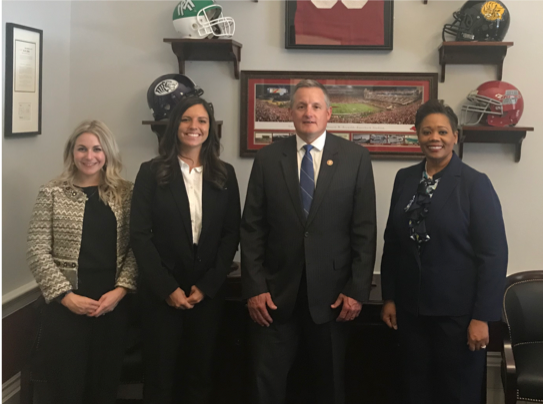
Our team had great meetings with all our Congressmen! Both Senator Boozman and Representative Westerman left committee meetings to speak with us and take a quick photo.
We told them that afterschool programs keep kids safe, inspire them to learn, and help working families by providing homework help, STEM (science, technology, engineering and math) education, mentoring, sports and physical activities, healthy snacks and meals, robotics, computer programming, college- and job-readiness, opportunities for hands-on learning, and more. We noted that years of research demonstrate that afterschool and summer learning programs work, and support a wide range of benefits for students, families, and communities.
We reminded lawmakers that these programs make it possible for many parents to work, as losing their afterschool programs would jeopardize their ability to hold jobs and support their families. We said that federal funds support afterschool programs for 11,628 Arkansas students. Ending federal funding for afterschool would result in fewer programs, diminished program offerings, and gutting partnerships between afterschool and summer learning programs and museums, businesses and colleges. At a time when 65,000 Arkansas children are unsupervised after the school day ends, we said we believe that we need more quality afterschool programs and we hope lawmakers, businesses, and foundations will come together to invest in afterschool. We went to Washington because we believe that by educating lawmakers about afterschool programs benefits our state. That was a message we were proud to deliver!
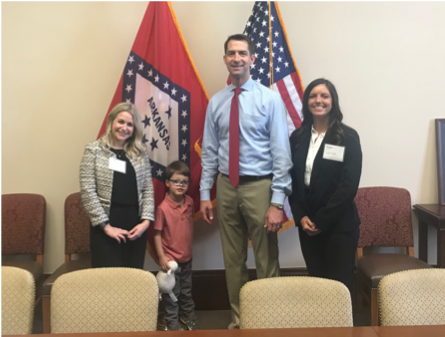
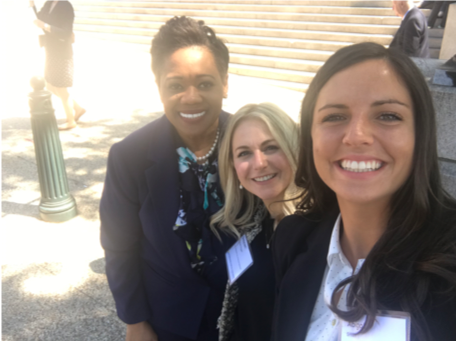
A special guest, Tom Cotton’s son, joined our meeting where we discussed expanding access to afterschool programs like ROTC and financial literacy to homeschool students.
While all of our meetings focused on different aspects and benefits of afterschool learning, one thing remained constant. All of our Congressional leadership supports afterschool and summer learning and are hopeful Congress will vote to sustain funding for afterschool and summer learning!
Now it’s your turn. Reach out to your Congressman and let them know that afterschool matters to you and your community with a letter, email or through social media. Invite them to take part in your summer learning celebrations and show them why afterschool and summer learning matters to you.
How To Celebrate Afterschool Professionals Throughout The Year
Afterschool Professionals Appreciation Week 2019 may be over, but that’s no reason to stop the celebration!
Our newest blog post gives tips and tricks to reward afterschool professionals for their hard work throughout the year in a way that won’t break the bank.
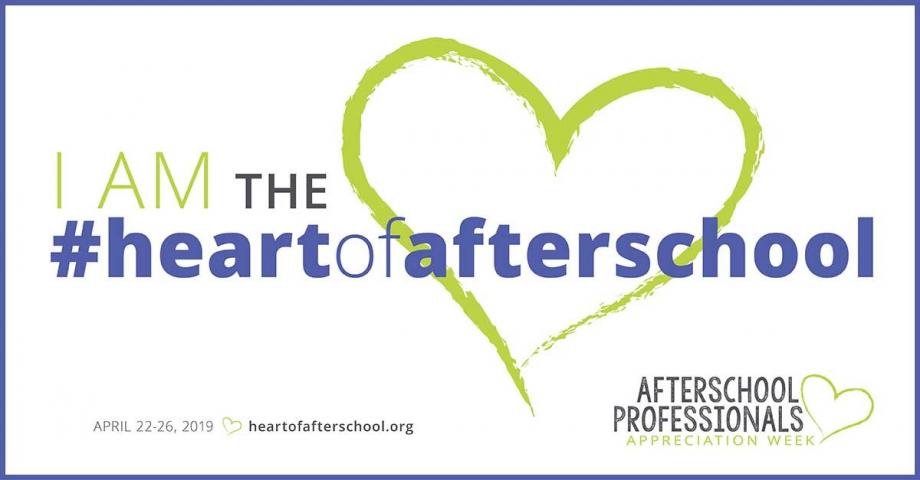
Create a positive workplace culture, improve staff engagement and lower turnover by adopting some of these simple employee appreciation ideas. You’ll be surprised how small acts of acknowledgment and thanks can have a big impact on your program!
For more information on Afterschool Professionals Appreciation Week, check out www.aosn.org
Strengthening Career and Technical Education Law Could Mean Big Changes For Afterschool And Summer Programming
August 10, 2018
Throughout the summer, there has been a lot of buzz on Capitol Hill regarding career and technical education. New funding legislation coupled with the National Governors Association’s announcement placing Arkansas Governor Asa Hutchinson as Chair of the Education and Workforce Committee means big opportunities for afterschool and summer learning in Arkansas. How does that impact your afterschool and summer learning programs? There is important language that could result in funding for programs supporting career education for students as young as 10-years-old.
On May 4, the Strengthening Career and Technical Education (CTE) for the 21st Century Act (H.R. 2353) was introduced in the House to provide greater opportunities to support student career pathways. This legislation emphasizes the importance of employability skills and makes career exploration an allowable use of CTE funding as early as the middle school.
This bill would reauthorize the Perkins Career and Technical Education (Perkins CTE) Act, which governs federal investments towards helping students gain education, credentials, training, and skills toward employment in well-paid, skilled, in-demand careers with $1.133 billion in funds for FY18, growing to $1.213 billion in 2023. This bill was last reauthorized in 2006.
On June 26, the Senate Committee on Health, Education, Labor and Pensions held an executive session regardingthe bipartisan Strengthening Career and Technical Education for the 21st Century Act.
The Senate bill focuses on flexibility and community decision-making to meet local needs and leverage local resources. Specifically, the bill provides:
- Inclusion of employability skills (like collaboration, communication, and problem solving)
- Ability to begin programming around subjects like career exposure and exploration as early as the middle grades (5thgrade and above)
- Inclusion of community-based partners in the state plan
- Collaboration with community-based and youth-serving organizations as a listed eligible use of local funds
Afterschool and summer programs have been a vital resource in supporting career exploration. Besides the great work programs do in supporting students gaining employability skills, they also introduce students to career pathways and provide skill sets, training, credits, and certification. Examples abound in these areas including automotive maintenance, aviation, welding, health care, engineering and digital technology, food services, construction, and more. Additionally, programs often focus on supporting students in non-traditional careers and providing opportunities to students from underrepresented groups.
On Monday July 23, 2018 the Senate passed bill S. 3217 Strengthening Career and Technical Education for the 21st Century Act. The House then accepted the Senate’s amendments on July 25 in House Bill H. 2353, which also passed the House. The bill was signed into law by the president on July 31.
Hutchinson Named NGA Education And Workforce Committee Chair
How does this impact Arkansas, specifically? It’s no secret that Arkansas has been at the forefront of career and technical education over the past few years. Our state has become a national leader in computer science education and workforce training programs under governor Asa Hutchinson’s leadership.
Recently, The National Governors Association named Hutchinson 2018-19 Chair of the Education and Workforce Committee. The committee is responsible for ensuring that the views of state leadership are represented in federal policy issues related to early childhood education, K-12 education, higher education, workforce development and career-technical education.
“This opportunity is an honor that will allow me to demonstrate at a national level the state-directed initiatives that have served us so well in preparing our students for high-paying, in-demand careers,” stated Hutchinson.
Hutchinson’s new role, coupled with the proposed federal legislation for career and technical education, makes Arkansas a likely candidate for pilot initiatives and increased funding for programs that support STEM workforce skills. It also means a national spotlight for Arkansas afterschool and summer learning programs.
Consider what your program is doing to emphasize career exploration and development. Partner with a local school, library, nonprofit or museum to offer increased workforce development opportunities for students. Afterschool and summer learning programs have the unique ability to provide individualized learning strategies beyond the regular classroom. Take advantage of partnerships and the new legislative policies to increase the reach and initiatives of your afterschool and summer learning programs.
To learn more about the Strengthening Career and Technical Education (CTE) for the 21st Century Actcheck out the Afterschool Alliance’s policypage.
April Roundup : Let’s Hear It For Afterschool!
by Graycen Bigger | May 7, 2018
April Roundup : Let’s Hear It For Afterschool!
The Arkansas Out of School Network team traveled to Washington DC to participate in the Afterschool Alliance’s Afterschool For All ChallengeApril 18 and 19. During the challenge afterschool supporters from all throughout the nation joined together to remind our policy makers why afterschool programs are a critical resource for youth, families and communities.
Our team was led by AOSN Network Coordinator Laveta Wills-Hale and included Afterschool Ambassador and Camp War Eagle Director Ben Rediske, Fayetteville Chamber of Commerce Executive Director Steve Clark, Economics Arkansas Executive Director Kathleen Lawson and Northeast Arkansas Intermodal Director Graycen Bigger.
To let Congress see the kinds of things happening in 21CCLC programs, the challenge kicked off with a showcase of afterschool programs on Capitol Hill. Youth presented projects, from handcrafted drones, to a 3D digital tour of an afterschool program, to videos chronicling the impact of their programs on youth and families. Five Youth Afterschool Ambassadorsclosed out the event by speaking about the powerful impact Afterschool has made in their lives.
The following day AOSN team met face-to-face with each of our state’s congressmen and their staff to make the case for quality programs in Arkansas. In one day afterschool advocates from across the nation met with 200 members of Congress or their staff while thousands of Americans logged more than 8,000 calls and emails to Congress, urging Congress to keep open the afterschool and summer programs funded by 21st Century Community Learning Center grants. Check out photos from our trip our on social media!
April 23-27 also marked the National Afterschool Association’s annual Afterschool Professionals Appreciation Week. Afterschool Professionals Appreciation Week is a joint effort of community partners and afterschool programs to recognize and appreciate those who work with youth during out-of-school hours. The week boasted celebrations and public relations efforts to encourage people to thank afterschool professionals like you who serve children in programs and organizations across Arkansas and the nation. Share your photos from Afterschool Professionals Appreciation Week with us and keep the love going!
While April was full of progress, positivity and celebrations, we can’t forget the fight for Afterschool isn’t over. The Trump administration has called for eliminating all Community Learning Center funding in its budget proposal. Elimination would result in 12,000 students in Arkansas and nearly two million children across the country, losing the afterschool programs that make learning exciting, and keep kids safe while parents work. It’s Congress, however, who has the power to decide what gets funded, and what does not. It’s not too late to reach out to your congressman and let them know that afterschool matters to you and your community.
My experience as an AmeriCorps VISTA with the Arkansas Out of School Network (AOSN) has been a great educational experience so far. I have experienced and learned so much about the afterschool sector in my home state. During my first week as a VISTA I attended a policy café sponsored by Arkansas Advocates for Children and Families with my supervisor. I did not know what to expect but I quickly discovered that the individuals participating in the afterschool discussion were deeply concerned about improving education in their schools. I realized that Out-of-School Time (OST) programs are valued and needed. I realized that we need more access to OST programs across the state. After policy café, I became even more committed to my project because there are 190,000 children and youth in Arkansas (grades K-12) who do not have access to an afterschool program in their community and that is a big issue for working parents in Arkansas. Through my project, I hope to make a positive difference by helping OST program leaders identify ways to sustain their afterschool programs.
I have been fortunate to have already had site visits with a couple of great afterschool programs. The leaders of these two programs have several things in common. They both are passionate about the children and about making an impact on youth. Most of all, they are both want to make a positive difference in their community by starting with the youth in their programs.
I made my first site visit on a beautiful fall day in late September. The 21st Century Community Learning Center program in Augusta, AR was a great program to kick-off my VISTA service journey. Mrs. Margie Mosby is the leader of this program and we discussed many ways that her program has been successful and things that she would like to improve. Before the children arrived I got a chance to tour the facility; which was very nice and as a child I would have loved to be there every day! All of the classrooms were filled with a SMART board and a SMART table which is used to teach interactive lessons with the youth. The kindergarteners and first graders have an interactive program on the computers, which helps them learn their spelling words and other lessons. On this particular day, a local bank representative had visited the day before so the children were working on balancing a checking book and getting the real world experience of learning about money. I really enjoyed seeing this because they were preparing the students for real life and the children will be able to use these valuable skills for the rest of their lives. I also got to see the program’s garden which will be one of the projects that we will to find funding for. The children were growing mums and poinsettias to sell to the community during their Lights On! Afterschool event.
My visit to the Life Skills for Youth (LSY) program just happened to coincide with their planning for their Lights On! Afterschool event scheduled for October 22nd. Mr. Larry Clark, Sr. started the LSY program to give youth a positive place so youth could build life skills to help them become successful adults. Located in a church in southwest Little Rock, the program serves the surrounding neighborhoods and works with the surrounding schools. There is always a waiting list. The program provides meals for all of the students and provides tutoring and enrichment activities that are all led by the amazing staff at LSY. I had the pleasure of meeting a parent of a child that attends the LSY program. The parent is also an educator and she said the program has had a good impact on her son who happens to be a straight “A” student at a local elementary school.
There is much work to be done and as I start my project I am excited about the journey and about helping the OST programs around the state.
Nurturing the Wonder of STEM: The Summer STEM Institute
by Mag Sudibjo | August 26, 2014
The Arkansas Out of School Network and the Arkansas Department of Education 21st CCLC joined this summer with the Arkansas Discovery Network, a partnership of Arkansas’ science museums dedicated to spreading STEM education (Science, Technology, Engineering, and Mathematics), to host the first of two three-day institutes in Springdale, Arkansas. Around 25 in-school and out-of-school-time (OST) educators from mostly Northwest Arkansas attended the workshop to learn various interactive ways they could engage students in STEM. These workshops promote a hands-on and inquiry-based approach to learning. Instructors encouraged students to ask the questions and experiment by themselves. As participants, we explored the physical, earth, and life sciences and discussed issues like environmentalism and conservation.
One topic we discussed in particular was the gender gap in STEM. According to a May U.S. Bureau of Labor report, women represent only about a quarter of professionals in STEM. One educator at my table suggested that girls are not interested in science and math because of the way we socialize them. Society tells girls that being a “geek” or “nerd” will not get her very far—not with Miley Cyrus and Lady Gaga as the most visible female role models. The problem, however, is not limited to girls. Children of color and other minority groups are often at a disadvantage when it comes to succeeding in STEM. A recent ACT report finds that less than half of Hispanic students and less than a quarter of African American students who expressed interest in STEM achieved math and science benchmarks compared to over 60 percent of white students and almost 80 percent of Asian students. Renowned African-American physicist Neil DeGrass Tyson understands and has remarked on the challenges and barriers people in minority groups face in the STEM world.
The Summer STEM Institute seeks to cross these boundaries by presenting STEM as enjoyable and exciting fields for all students. As a participant, I can attest that the interactive approach to learning can be extremely fun. Rather than just hearing about static electricity and air pressure, we rubbed balloons together and played with blow dryers. The inquiry process is not only better for retaining knowledge but also helps foster student’s curiosity, creativity, and critical thinking skills. After all, science exists because somebody asks a question and wonders why something works.
During the workshop, we held a boat design competition; assembled wind vanes; and built motors out of batteries, magnets and stripped wires. We examined the extraordinary strength of Bess Beetles (one can carry over 20 times its body weight) and created our own worm farms. We asked questions and wondered why. The message was clear: when we left the workshop, we were to spread this feeling of wonder in the sciences to all our children. STEM is an essential part of future development, and educators can and should make STEM fun for everyone.
The task to integrate STEM into our children’s education may be a challenge. With all the requirements teachers now face, educators may have less time for STEM in the classroom. However, OST programs provide wonderful opportunities for educators to supplement students’ STEM education. STEM is just as important as other subjects, and afterschool and summer programs can be great settings to conduct these more interactive activities.
In the end, all children deserve to revel in the wonder of STEM. If we adults can have fun playing like little kids in the name of STEM, imagine how actual kids would react.
This July, the University of Arkansas’s Criminal Justice Institute (CJI) partnered with the Arkansas Department of Education, the Arkansas Safe Schools Association, the Attorney General’s Office and the Arkansas Department of Human Services to host the 10th Annual Safe Schools Conference. The Arkansas Out of School Network was an exhibitor at the event and provided booklets on bullying and suicide along with other afterschool resources. Close to 300 educators and law enforcement officers assembled at the Wyndham Riverfront Hotel in North Little Rock to discuss issues related to student safety including drug trends, bullying, suicide prevention, and LGBTQ awareness. Though presenters spoke about various aspects of safety, one recurring theme was student use of social media.
In light of today’s technology-driven world, social media and online safety have become increasing concerns for both educators and law enforcement officers. The National Center for Education Statistics reports that, while face-to-face confrontation is still the most common form of bullying, cyberbullying is on the rise. According to the Cyberbullying Research Center, nearly one in four students surveyed said that they had been victims of cyberbullying at some point in their lives. About 15 percent said that they had committed cyberbullying. These growing numbers are worrisome especially since studies show that being bullied and bullying are closely connected with suicide, one of the leading causes of adolescent death.
As we begin this school year, let us be mindful of the different types of bullying that can occur both in and out of school. For more information on bullying and how to prevent it, please visit Stopbullying.gov. Let us all work to make this school year safe for all our students.
| << Previous 1 - 2 Next >> |




